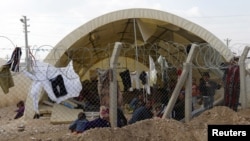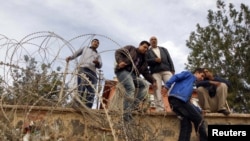U.S. officials are calling for more international aid to Syria's population, with nearly half a million Syrians now refugees from the 20-month-long uprising against President Bashar al-Assad.
U.S. Ambassador to Syria Robert Ford says the United States will press others in the international community to provide increased humanitarian aid for Syrians at next month's high-level diplomatic meeting of the so-called "Friends of the Syrian People."
Speaking at a conference in Washington Thursday, the ambassador also suggested that the U.S. government could eventually recognize Syria's newly-formed opposition council as the legitimate representative of the Syrian people.
"We would like to see them continue to develop as an organization, as a coalition. They are making real progress, and I expect that our position with them will evolve as they themselves develop," said Ford.
Any formal recognition from Washington would put the United States in line with several of its European and Arab allies. It also would open the door for more U.S. assistance for Syrians.
So far, the United States is the biggest bilateral donor of humanitarian aid to the country with nearly $200 million already provided.
Since February, the number of Syrian refugees has increased from 15,000 to nearly half a million, while the number of civilians displaced inside the country has increased 25-fold to almost one million.
The State Department's Kelly Clements, who helps oversee U.S. aid for Syria, says these growing numbers will increase the Syrian people's calls for aid.
"The needs will likely double going forward in terms of the first half of 2013," she said.
However, the current response plans - which expire at the end of the year - still are barely halfway funded. Clements attributes this to donor fatigue.
"Syria is one of the largest humanitarian crises in the world today, but it is not the only one. We have the Sahel obviously, Sudan and other humanitarian emergencies around the world, and I think what we are seeing is donors trying to balance to the extent possible these competing needs, which continue to rise," she said.
Clements says another problem is that it is difficult to get accurate information out of Syria on what the people there need.
Thursday's news that the Syrian government had cut the country's Internet access and phone service promised to further complicate the issue.
Ambassador Ford says it is clear that the Syrian military is weakening. But he insists that U.S. aid should not, at this time, extend to arming the opposition, which continues to ask for weapons.
"Arms are not a strategy. Arms are a tactic. Efforts to win this by conquering one side or the other will simply prolong the violence, and frankly, aggravate an already terrible humanitarian situation. Syria needs a political solution," he said.
But Ford says there is no sign yet of any political deal between the opposition and the government, so the fighting that has claimed tens of thousands of lives will continue.
U.S. Ambassador to Syria Robert Ford says the United States will press others in the international community to provide increased humanitarian aid for Syrians at next month's high-level diplomatic meeting of the so-called "Friends of the Syrian People."
Speaking at a conference in Washington Thursday, the ambassador also suggested that the U.S. government could eventually recognize Syria's newly-formed opposition council as the legitimate representative of the Syrian people.
"We would like to see them continue to develop as an organization, as a coalition. They are making real progress, and I expect that our position with them will evolve as they themselves develop," said Ford.
Any formal recognition from Washington would put the United States in line with several of its European and Arab allies. It also would open the door for more U.S. assistance for Syrians.
So far, the United States is the biggest bilateral donor of humanitarian aid to the country with nearly $200 million already provided.
Since February, the number of Syrian refugees has increased from 15,000 to nearly half a million, while the number of civilians displaced inside the country has increased 25-fold to almost one million.
The State Department's Kelly Clements, who helps oversee U.S. aid for Syria, says these growing numbers will increase the Syrian people's calls for aid.
"The needs will likely double going forward in terms of the first half of 2013," she said.
However, the current response plans - which expire at the end of the year - still are barely halfway funded. Clements attributes this to donor fatigue.
"Syria is one of the largest humanitarian crises in the world today, but it is not the only one. We have the Sahel obviously, Sudan and other humanitarian emergencies around the world, and I think what we are seeing is donors trying to balance to the extent possible these competing needs, which continue to rise," she said.
Clements says another problem is that it is difficult to get accurate information out of Syria on what the people there need.
Thursday's news that the Syrian government had cut the country's Internet access and phone service promised to further complicate the issue.
Ambassador Ford says it is clear that the Syrian military is weakening. But he insists that U.S. aid should not, at this time, extend to arming the opposition, which continues to ask for weapons.
"Arms are not a strategy. Arms are a tactic. Efforts to win this by conquering one side or the other will simply prolong the violence, and frankly, aggravate an already terrible humanitarian situation. Syria needs a political solution," he said.
But Ford says there is no sign yet of any political deal between the opposition and the government, so the fighting that has claimed tens of thousands of lives will continue.





